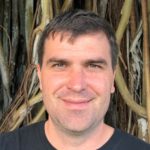Neighbourhood interest in the USA
- Case studies from IPCC authors
- Conversation shops in Senegal
- Talking your audience’s language in Indonesia
- Energising analogies in Ukraine
- Flooding conversations in Colombia
- The bigger picture in Japan
- Local stories in Mozambique
- Informing policy in the Caribbean
- Stitching in detail in India
- Connecting personally in Argentina
- Neighbourhood interest in the USA
- Unpacking the science in France
This case study is part of a set of case studies commissioned by the IPCC WGI TSU (Intergovernmental Panel on Climate Change, Working Group I Technical Support Unit) and collected by Climate Outreach.
Dr Alex C. Ruane shares how he has responded to the hunger in communities for expert input to guide local protective action, adapting the metaphors he uses to open up the science for diverse inhabitants of downtown New York.

Dr Alex C. Ruane, NASA Goddard Institute for Space Studies – Author for Sixth Assessment Report, Climate Change 2021: The Physical Science Basis and contributor to Special Report: Climate Change and Land, 2019, @AlexRuane, @NASAGISS
“There is tremendous public interest in climate change, and many community groups confront the climate challenge by seeking out expert information and opportunities to make a difference that can responsibly safeguard the people, society, and natural systems they love.
One example is when I was invited to speak at the St. Francis Xavier High School following Sunday Mass in Manhattan, New York, drawing in parishioners as well as members of the high school and neighborhood communities for a discussion on climate change challenges and opportunities. The presentation was designed to engage the audience across diverse levels of scientific experience and cultural backgrounds but with a shared concern over the ways in which our actions are having unintended consequences on key elements of society and nature.
After a brief discussion on the basics of climate science including the difficulty of relating daily weather to long-term climate changes, the presentation focused on how the changing climate system was affecting food, ecosystems, oceans, cities, and vulnerable communities. Direct discussion of impacts and vulnerability make climate change real, translating from hard-to-relate quantities like parts-per-million CO2 concentrations and degrees Celsius to items on your dinner plate, the coastlines we enjoy and the cities where many of us live.
I also connected climate change issues to more relatable analogies such as sea level rise effects on floods being like raising the floor of a basketball court (resulting in more dunks when the hoop is easier to reach) or uncertainties about how much more carbon we can emit before catastrophic impacts being like a patient asking a doctor how many more cigarettes they can smoke without catching lung cancer (we can’t be sure, but it would be wise to cut back now).
The presentation ended by noting that time is a factor, which means our inaction has consequences, but also with a more positive tone: ‘We can reduce climate change and prepare for its consequences’, underscoring that scientists have reason to believe that we can anticipate many future challenges, giving us an opportunity to prevent them from occurring even as we also prepare to deal with impacts that we cannot avoid.”
This case study is a great example of putting the following principles for effective public engagement into practice.
- Principle 2: Talk about the real world, not abstract ideas (see Handbook page 8)
- Principle 3: Connect with what matters to your audience (see Handbook page 11)
- Principle 5: Lead with what you know (see Handbook page 17)
Find out more about the six principles in our Communications Handbook for IPCC scientists and accompanying webinar.

If you would like to contribute a case study of your public engagement experiences as an IPCC author, we would love to hear from you. Please share your stories with the WGI Technical Support Unit directly.
Reports & guides
Sign up to our newsletter
Thank you for signing up to our newsletter
You should receive a welcome email shortly.
If you do not receive it, please check your spam folder, and mark as 'Not Spam' so our future newsletters go straight to your inbox.

